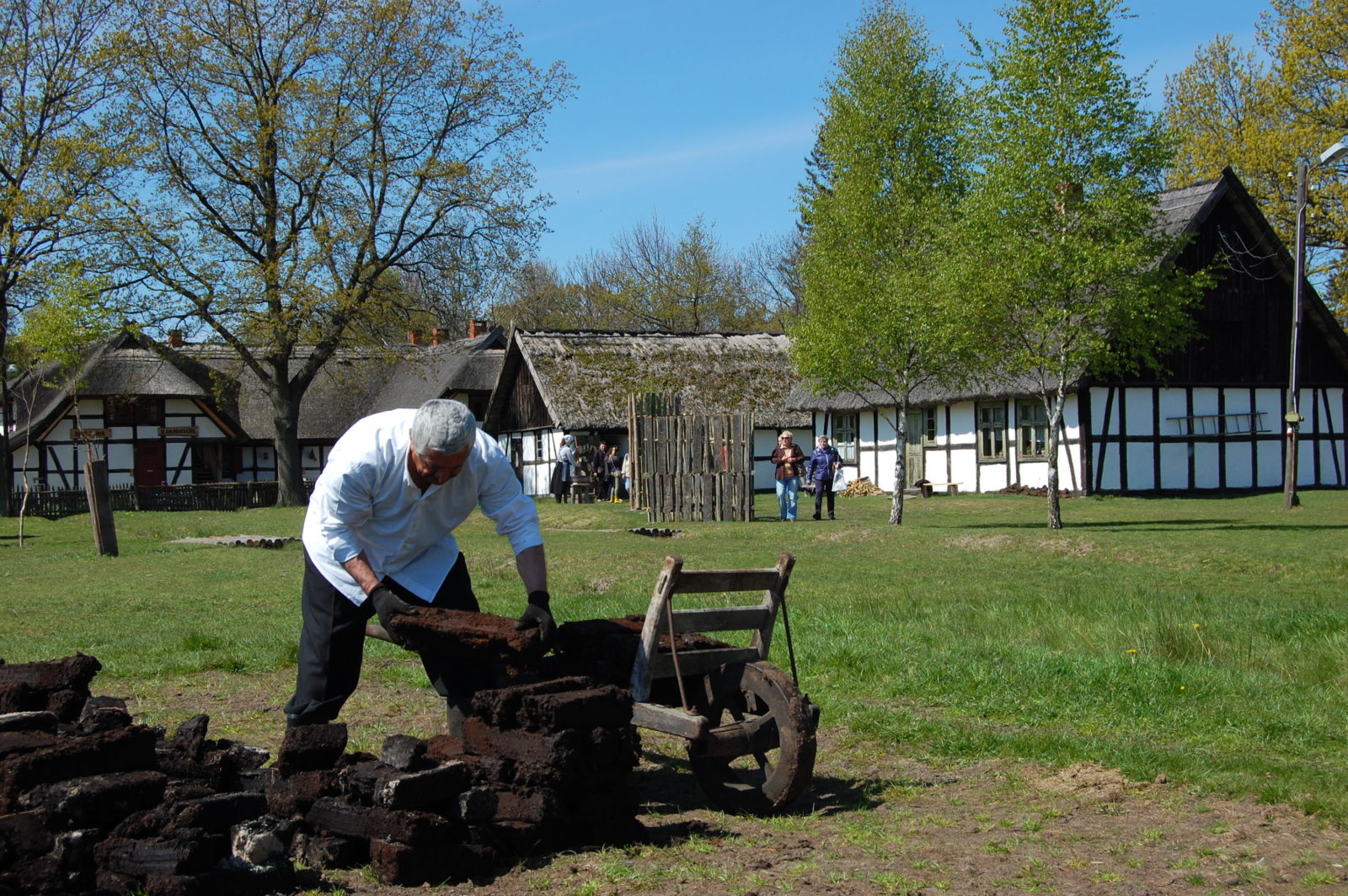
Events
Black Wedding
May 1st, 10.00 – 16.00
Schwarze Hochzeit – such was the name of the May practices of digging of peat, which was the standard fuel in the 19th century. Acquiring peat was joint work of all the inhabitants of the village and each day’s work was concluded with a feast, hosted by those who the peat was collected for. The museum’s Black Wedding event retells that old story, where visitors can see people during different stages of peatbog mining near the homesteads. It also lets the attendees spend a few hours among the hundred-year-old houses, seeing men and women performing their mundane and not-so-mundane tasks of living a 19th-century countryside life.
On countryside paths and in the homesteads – Children’s Day in the museum
June 1st, 11.00 – 14.00
The event is an attempt to bring back the feel of old countryside lifestyle, in the open air as well as inside the cottages. Special emphasis is placed on the life of the youngest members of the community. Contemporary children get to know the tasks and chores that life used to demand of their playmates from the old times. Supervised by the employees of the museum, kids get to wash and mangle clothes, weave fishing nets, make pottery or ropes. They are free to move about between homesteads, or stop on paths and streets to participate in games that used to be popular among small Pomeranians of the old times. When they get tired, eventually, they may take a seat on the grass, play along with a Kashubian children’s art group or roast sausages over a bonfire.
Sunday with the Klicks
Each Sunday in July, 11.00 – 15.00
An event showing the day off in Kluki’s homesteads. Sunday-specific interior arrangements, special treats, dances to the tones of a concertina and old-time children’s games will be the focus of each summer Sunday in Kluki.
A Sunday in the Slovinan village of Kluki was primarily the breather from hard work as well as a chance to serve food which was much richer than on regular workdays. The Klicek family started off with a breakfast consisting of scrambled eggs, a tray of smoked meats and freshly roasted coffee. While visiting the Kluki museum on a summer Sunday, one will see such a richly decorated breakfast table as well as witness the roasting of coffee, following the tasting of freshly ground mix of natural and ersatz coffee.
After a common prayer and a family dinner, the members of a Slovinian family took on pastime activities and did minor chores in the homestead. This was the time for women’s chit-chat with yeast waffles and cakes, making knitwork, men’s games of cards, sometimes even dances with local music. Kids were free to play on Sundays – there was no school, there was also less to do around the homestead – so next to the houses of Jost and Klicek, the museum hosts a variety of old-time children’s games.
On a Slovinian farm
July 18th – August 12th (Tuesdays to Saturdays), 10.00 – 16.00
A series of presentations allowing the visitors to notice the changes in the lifestyle of the local inhabitants that occurred between 1917 and 1950 – within the timespan presented in the homesteads. A poor fisherman’s cottage from 1917 shows the locals making butter, cooking potato soup, weaving thread and making stitchwork. Outside, baskets and fishing nets are woven and ropes are made. In a 1930s homestead, the practices show a much higher Slovinian countryside life standard, influenced by technological advances and developments in farming. In a 1940s Slovinian house and a 1950s Vilnius settler house people make preserves and dishes characteristic of the Vilnius region, knit lace, press clothes with charcoal and metal insert irons, or grind the grain.
The autumn is asking what the summer has done. Farewell with the summer
Third Sunday of September, 10:00-16:00
On this day, visitors may see as the farms and fishing homesteads get ready for the coming of winter. There is pitching of fishing boats, mending of nets, smoking of the caught fish, threshing and winnowing of grain. The crops are prepared to survive the winter: cabbage is pickled, beetroot juice is pressed, potatoes, grain and turnips are stored.
Inside the houses one may find pots overflowing with turnip soup and Slovinian Klitundplumen, sausages being made, cowberies with plums being preserved and grain coffee being roasted. All throughout the event, Pomeranian cultural groups present the local harvest and wedding customs.









